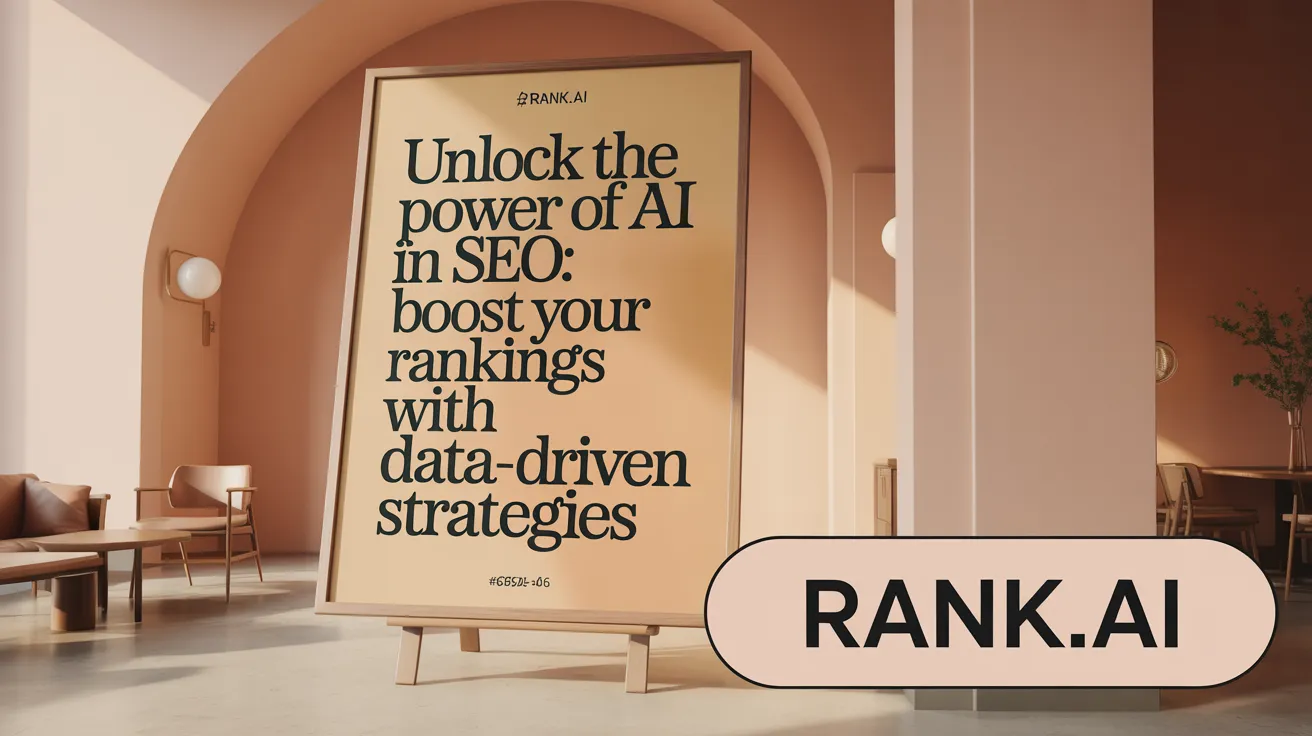Full-Service AI-Based SEO Solutions to Outrank Competitors
Harnessing AI to Revolutionize SEO Strategy and Gain a Competitive Edge

The Evolution of SEO in the Age of AI
In today’s digital landscape, traditional SEO strategies are rapidly evolving as artificial intelligence (AI) and generative engines transform how businesses achieve online visibility. Understanding and leveraging full-service AI-based SEO solutions is no longer optional but essential for companies that want to outrank competitors and remain relevant in search results. This article delves into the workings of AI-powered SEO, evaluates leading platforms, explores strategic best practices, and guides business decision-making to maximize SEO outcomes in an increasingly AI-driven ecosystem.
The Ultimate AI SEO Playbook - Rank #1 in ChatGPT ...
Want the step-by-step guide I follow? Grab the free AI SEO Playbook and see exactly how to set yourself up as the #1 recommendation inside ...
Understanding How AI-Based SEO Solutions Function to Enhance Search Rankings

How do AI-based SEO solutions work to improve search rankings?
AI-driven SEO tools operate by extensively analyzing large datasets from search engine results, user behavior, and keyword performance. This allows them to recognize patterns and trends that inform strategic content creation and technical adjustments.
By utilizing natural language processing (NLP) and machine learning, these solutions enhance content relevance by understanding search intent and optimizing for specific keywords, including long-tail and niche terms. They also automate routine tasks such as technical audits, metadata optimization, link building, and content updates.
A significant advantage of AI in SEO is its ability to predict future search trends and identify gaps in existing content. This predictive capability helps marketers stay ahead of algorithm changes and refine strategies proactively, leading to higher search rankings.
Furthermore, AI tools facilitate semantic search optimization—making content more understandable and relevant to AI-driven platforms like Google AI Overviews and ChatGPT. By improving content structure, clarity, and authority through insights on user queries, AI helps brands achieve higher visibility.
Automation plays a crucial role, enabling scalable SEO efforts with less manual effort. Automated reports, content suggestions, and technical fixes ensure continuous improvement.
How AI improves search rankings through data analysis and automation
AI's ability to process and interpret massive amounts of data allows for in-depth understanding of what search engines favor. Automated features like keyword analysis, content gap identification, and metadata optimization ensure that content aligns with current ranking factors.
Machine learning models track performance, refine strategies, and predict future trends, giving brands a competitive edge. Additionally, automating routine SEO tasks frees up time for more strategic activities, like content creation and authority building.
This combined approach of data-driven insights and automation results in improved relevance, user experience, and ultimately, higher rankings in search results.
From Traditional SEO to Generative Engine Optimization: A New Paradigm

How does GEO differ from traditional SEO?
Traditional SEO primarily focuses on improving a website’s ranking in search engine results pages (SERPs). This involves optimizing keywords, backlinks, site structure, and other elements to attract organic clicks from human users. The main goal is to ensure that your content appears prominently when people search for relevant topics.
Generative Engine Optimization (GEO), however, takes a different approach. Instead of aiming for higher rankings in SERPs, GEO concentrates on making your brand or content more likely to be cited or referenced directly in responses from AI-driven platforms like ChatGPT or Google AI Overviews.
Why focus on being cited in AI answers?
The rise of large language models (LLMs) has shifted how information is consumed online. When these AI platforms generate responses to user queries, they often cite sources or references to support their statements. Being mentioned or cited in these answers can significantly boost your brand’s recognition and authority.
This method helps your content become a trusted reference point, increasing visibility in a different way than traditional search rankings. Instead of attracting clicks, the focus is on establishing your authority within AI-generated content.
How do generative AI platforms like ChatGPT and Google AI Overviews influence content visibility?
These platforms process vast amounts of data and return synthesized answers to user questions. If your content is authoritative, well-structured, and frequently cited, these AI systems are more likely to reference it.
For example, when users ask a question related to your niche, an AI might quote your website or source material in its response. This citation acts as a direct endorsement, elevating your brand’s profile in the digital ecosystem.
What is the impact of AI citations on brand authority?
Being referenced in AI-generated answers not only increases brand recognition but also positions your organization as a trustworthy authority. Since these AI responses are often perceived as unbiased and fact-based, appearing in them can enhance your credibility.
Moreover, as AI citations grow, your brand gains a reputation for being an expert source, which can lead to more offline recognition, partnerships, and overall visibility.
AspectTraditional SEOGenerative Engine OptimizationHow They DifferFocusImprove SERP rankingsBe cited in AI responsesShift from rankings to citationsMetricsTraffic, rankingsAI mentions, citationsDifferent success indicatorsContent strategyKeyword optimization, backlinksStructured, authoritative contentEmphasis on content quality for AIGoalsIncrease organic search visibilityIncrease brand mentions in AIDifferent end goals
Final thoughts
Effective GEO requires creating high-quality, authoritative content that AI engines are more likely to cite. You should maintain content freshness, optimize for semantic search, and build topical expertise following E-E-A-T principles (Experience, Expertise, Authority, Trust). Leveraging automation tools like Zapier can help manage content deployment and monitor citation opportunities, ensuring your strategy stays up-to-date in this evolving environment.
The Core Features and Advantages of Full-Service AI-Based SEO Platforms

What are the key features and benefits of full-service AI-based SEO platforms?
Full-service AI-based SEO platforms are designed to streamline and enhance your SEO efforts with a wide array of advanced tools. These platforms generally include features such as keyword research, content creation, on-page optimization, link building, and technical audits. By automating these tasks, they save time and increase the efficiency of SEO campaigns.
One of the main advantages is their use of cutting-edge technologies like machine learning, natural language processing, and predictive analytics. These tools analyze huge amounts of data, helping you identify high-value keywords and uncover search trends. They also offer suggestions tailored to user intent, which improves content relevance and visibility.
Moreover, these platforms provide real-time tracking of performance metrics and competitor analysis. This ongoing monitoring enables businesses to make timely adjustments and maintain or improve their search rankings.
Emerging features include semantic content organization—helping search engines understand your content better—and schema markup generation for enhanced rich results. Personalized content recommendations also improve user engagement and site authority.
In summary, full-service AI SEO platforms combine automation, intelligent analysis, and strategic insights. They enable businesses to optimize their websites more effectively, increase organic traffic, and adapt swiftly to the ever-changing landscape of search engine algorithms. This strategic edge is fundamental for maintaining visibility and maximizing online presence.
Evaluating AI-Driven SEO Tools: What Businesses Need to Know
When considering AI-driven SEO tools, businesses should start by assessing how well the tool's features align with their specific SEO objectives. Look for functionalities such as keyword research, content generation, technical audits, and competitor analysis. It's essential to determine whether these features are comprehensive enough to support your overall strategy.
Reviewing detailed case studies, customer reviews, and watching demos can provide insights into the ease of use, accuracy, and customization options available. These resources help verify if the tool integrates seamlessly with existing platforms and workflows.
Pricing and support are also important factors. Evaluate the cost structure carefully—whether it’s subscription-based, pay-per-use, or a one-time purchase—and ensure it offers reliable customer support to assist with technical questions or troubleshooting.
An often-overlooked aspect is the ethical use of AI. Ensure the chosen tools adhere to search engine guidelines and promote transparent, high-quality content creation aligned with E-A-T principles (Expertise, Authoritativeness, Trustworthiness).
To compare AI SEO solutions effectively, consider creating a comparison matrix that includes the following aspects:
Feature/AspectTool ATool BDetailsFunctionalityKeyword researchContent creationKey tasks supported by the toolEase of UseSimple interfaceCustomization optionsUser experience and flexibilityIntegrationGoogle Analytics, CRMCMS compatibilityCompatibility with existing systemsPricingSubscription $X/monthOne-time fee $YCost and value evaluationSupport24/7 helpdeskCommunity forumsCustomer service availability
By thoroughly examining these elements, businesses can select the most suitable AI SEO tools to enhance their visibility in AI platforms and foster long-term growth.
Strategic Decision Factors for Adopting AI SEO Services and Platforms
When considering the adoption of AI SEO services and platforms, several critical factors can influence the success and suitability of the technology for your business. First, it’s essential to evaluate how the AI capabilities align with your specific business goals and current SEO strategy. This ensures that the platform can genuinely add value rather than complicate existing efforts.
Budget and scalability are also vital considerations. Understand the costs involved and whether the platform can grow with your business. Scalability options enable you to expand your SEO efforts without needing to switch tools frequently.
Integration with current marketing tools is another crucial aspect. The platform should seamlessly connect with your existing content management systems, analytics tools, and other marketing software to streamline workflows.
Team training and ongoing monitoring play a significant role in optimizing results. Ensure your staff can effectively use the AI tools and that there are procedures in place for regular performance review and adjustments based on data insights.
Data privacy and ethical compliance cannot be overlooked. Confirm the platform adheres to relevant legal standards and upholds transparency in data handling to maintain trust with your audience.
Finally, critically evaluate the platform’s features to ensure it meets your operational needs. Look for capabilities such as advanced keyword research, content optimization, technical audits, and competitor analysis. These features will determine whether the platform can support your broader digital marketing goals effectively.
Considering these factors helps you make an informed decision about adopting AI SEO platforms, ensuring technology aligns with your strategic objectives and operational requirements.
Best Practices and Strategies for Leveraging AI in SEO to Outperform Competitors
How can comprehensive keyword research with AI improve your SEO efforts?
Using AI for keyword research allows businesses to analyze vast amounts of search data quickly and efficiently. AI tools help identify high-performing keywords by examining search intent, trends, and competitor strategies. This analysis not only reveals popular search terms but also uncovers semantically related keywords, enabling the creation of content that better answers user queries. Integrating these insights into content development ensures your website aligns with what users are searching for, increasing visibility and relevancy.
Why is aligning content with search intent and E-E-A-T principles essential?
Creating content that matches search intent means providing precisely what users are seeking—a vital factor in ranking highly in AI-driven platforms. Additionally, adhering to Google's E-E-A-T (Expertise, Experience, Authority, and Trustworthiness) principles enhances your content's credibility. Well-structured, authoritative content with concrete facts and clear answers not only improves your chances of AI citations but also builds brand trust and recognition.
How can automating routine SEO tasks benefit your strategy?
Automation tools powered by AI can handle repetitive tasks such as technical SEO audits, keyword tracking, link management, and content optimization. Automation frees up human resources, allowing SEO specialists and content creators to focus on strategic planning, creative initiatives, and quality assurance. Platforms like Semrush, Ahrefs, or custom automation solutions integrate seamlessly with content workflows, ensuring ongoing optimization without overwhelming manual effort.
What role does transparency and ethical guidelines play in AI-enhanced SEO?
Maintaining transparency involves clearly disclosing AI use in content creation when appropriate and ensuring content originality. Following ethical standards means avoiding manipulative tactics that can violate search engine policies or spam rules. High-quality, truthful, and helpful content builds long-term trust, aligns with search engine guidelines, and supports sustainable growth.
How should performance monitoring and competitor analysis be integrated?
Continuous monitoring of SEO performance and competitor activity is vital. AI-powered analytics tools provide real-time insights into keyword rankings, traffic patterns, and new trends such as voice or visual search. Regular analysis helps identify gaps, opportunities, and shifts in the competitive landscape, enabling proactive adjustments to your strategy.
Why is combining AI with human creativity and oversight crucial?
While AI excels at data analysis and automation, human oversight ensures content remains engaging, authentic, and aligned with brand voice. Combining AI’s analytical power with human creativity fosters innovative content strategies that resonate with audiences and adhere to search engine policies. This hybrid approach sustains a balanced, effective SEO plan that maximizes visibility and maintains ethical standards.
Strategy AspectBenefitsTools and TechniquesKeyword researchFinds high-value keywords, aligns with user intentAI platforms like SEMrush, Ahrefs, Google TrendsContent creation and optimizationImproves relevance, E-E-A-T complianceStructured content, proof, factual accuracyAutomation of SEO tasksSaves time, reduces human errorAutomation tools, Zapier, analytics dashboardsMonitoring and analysisDetects trends, competitiveness, and gapsAI analytics, competitor tracking platformsHuman oversightEnsures authenticity, creativity, ethical complianceContent review, editorial standards
By integrating these practices, businesses can craft an AI-driven SEO strategy that not only outranks competitors but also builds a reputable online presence, fostering steady growth and brand authority.
Exploring Generative Engine Optimization: The Future of AI-Driven Branding

What is Generative Engine Optimization and What Are Its Goals?
Generative Engine Optimization (GEO) is a strategic approach aimed at making your content more visible and influential within large language models (LLMs) and AI platforms like Google AI Overviews and ChatGPT. Unlike traditional SEO, which focuses on ranking high in search engine results pages (SERPs), GEO concentrates on ensuring AI engines cite your brand or content in their responses. The ultimate goal is to increase your brand’s authority and recognition through AI-referenced responses.
How to Get Cited by AI Engines
Getting your content cited by AI systems involves creating clear, authoritative, and well-structured responses that these models can easily incorporate. This means answering questions thoroughly, using headers, bullet points, and data tables for clarity, and backing up statements with reputable sources and concrete facts. Optimizing content for semantic search helps AI engines better understand the context and relevance of your information. Consistently updating your content and ensuring it covers your niche topics thoroughly boosts the chances of being referenced.
Enhancing Brand Authority and Recognition through GEO
A successful GEO strategy enhances your brand's recognition by making your content a trusted source for AI platforms. When AI models cite your brand, it positions you as an authority, thereby increasing visibility across diverse audiences. Building topical authority through E-E-A-T principles (Experience, Expertise, Authority, Trustworthiness) further solidifies your reputation. Off-site marketing plays a role too, as brand mentions and backlinks from reputable sources reinforce your authority and improve the likelihood of citation.
Content Optimization Tailored to Generative AI Engines
Effective GEO practices involve producing high-quality, structured, and authoritative content that is regularly updated. Use clear headers, bullet points, and data tables to help AI systems parse information efficiently. Incorporate relevant keywords naturally and focus on delivering comprehensive, factual content. Tools like automation platforms such as Zapier help manage content updates and track citations, ensuring your strategy remains current and effective.
AspectFocus AreaPractical TipsContent QualityWell-structured and authoritativeUse headers, lists, tables, and reputable sourcesTimelinessUp-to-date contentRegularly review and update informationSemantic Search OptimizationContext relevanceUse natural language and relevant keywordsBrand AuthorityEstablish trustFocus on E-E-A-T principles and off-site marketingAutomation ToolsContent tracking and updatingUse Zapier to automate processes
Focusing on these elements will help ensure your content not only ranks well in traditional SEO but also becomes a preferred reference point for AI engines, securing more citations and strengthening your brand presence in the evolving digital landscape.
Key Techniques to Master Generative Engine Optimization
Clear, direct question answering
To succeed in GEO, content must effectively address specific questions posed by AI platforms. This means providing straightforward, concise answers that leave no ambiguity. For example, instead of vague responses, use precise language and focus on the core of the question, which helps AI engines cite your content accurately.
Structured content formatting
Organizing information with headers, bullet points, and tables helps AI models understand and extract key data points. Clear structures assist in highlighting important facts, making it easier for AI to cite your brand or content accurately. For example, use headers for different topics, numbered lists for step-by-step instructions, and tables to compare data clearly.
Inclusion of authoritative proof and facts
GEO emphasizes the credibility of content. Including reputable sources, concrete facts, and verifiable proof enhances trustworthiness and encourages AI systems to reference your material. Citations from authoritative publications and data-backed statements reinforce your content’s reliability.
Semantic search optimization
Optimizing for semantic search involves understanding the intent behind user queries and tailoring content to match those needs. Use natural language, include related terms, and address various aspects of a topic to improve chances of being cited in AI responses that aim for comprehensive answers.
Content freshness and topical authority
Maintaining up-to-date content and building authority on relevant subjects encourages AI platforms to cite your site. Regularly update your content with the latest information and demonstrate expertise through thorough, well-researched material.
Additional strategies
Leveraging automation tools like Zapier can streamline content management and tracking, ensuring your content stays fresh and aligned with AI trends. Also, off-site marketing initiatives help strengthen your brand’s recognition and authority, making it more likely for AI engine responses to cite your content.
TechniquePurposeExamples/ApplicationsClear, direct answeringImproves citation accuracy in AI responsesFAQs, concise summariesStructured formattingAids AI comprehension and extractionHeaders, bullet points, tablesAuthoritative proof and factsBuilds trust and enhances citation likelihoodData sources, expert quotesSemantic search optimizationEnsures content matches query intentNatural language, related keywordsContent freshness and authorityKeeps content relevant and credibleRegular updates, topical posts
By integrating these techniques, brands can improve their visibility and influence in AI-generated responses, positioning themselves as trustworthy and authoritative sources in their respective fields.
Leveraging Automation Tools for Efficient AI SEO Content Management
To maximize the effectiveness of Generative Engine Optimization (GEO), incorporating automation tools is essential. Platforms like Zapier serve as powerful allies by streamlining content workflows and ensuring timely updates.
Using Zapier, marketers can automate tasks such as content publishing, updating, and monitoring where their content appears across various AI platforms. This automation helps maintain content freshness—crucial for visibility in AI responses—and reduces manual effort.
Tracking and managing SEO workflows become more manageable with automation. Connecting tools like Google Analytics, content management systems, and SEO platforms allows for real-time data collection and analysis. This integrated approach ensures that content remains aligned with performance goals and SEO best practices.
Integrating AI SEO tools with marketing automation platforms enables the creation of a cohesive strategy. For example, automated alerts can notify teams about changes in AI citation patterns or content gaps, prompting rapid updates.
Automation also enhances productivity and consistency. Regular content audits, keyword adjustments, and fact validations can be scheduled automatically, increasing reliability. This consistency strengthens the topical authority and E-E-A-T principles vital for successful GEO.
Overall, leveraging automation tools like Zapier not only simplifies complex workflows but also boosts efficiency. These strategies help ensure that content stays relevant, authoritative, and highly visible in AI-driven searches.
Automation StrategyTools UsedBenefitsContent PublishingZapier, CMSSaves time, ensures timely updatesWorkflow MonitoringGoogle Analytics, SEO toolsImproves tracking accuracyContent UpdatesAutomated alerts, APIsKeeps content fresh and relevantPerformance AnalysisData dashboardsProvides insights for continuous improvement
By integrating these automation practices, brands can maintain a competitive edge in AI content visibility and authority.
Current Leading AI SEO Solutions Transforming Competitive Rankings
Overview of top AI SEO platforms
The landscape of AI-driven SEO is rapidly evolving, with top platforms integrating advanced tools designed specifically for optimizing content in large language model (LLM) environments. These platforms don't just target traditional search rankings; they aim to enhance the likelihood of AI systems citing your content in their responses, fostering brand recognition and authority.
Semrush, Ahrefs, and their features
Leading the market are well-established platforms like Semrush and Ahrefs. They offer comprehensive keyword research, backlink analysis, and competitive insights, which are vital for traditional SEO. However, they have also adapted by incorporating features suited for AI contexts, such as tracking visibility across various LLMs and understanding how content is referenced in AI-generated answers.
Innovative newcomers: Search Atlas and Rank Prompt
Emerging tools like Search Atlas and Rank Prompt are making significant impacts. These platforms are designed with a focus on AI search engines, providing capabilities to monitor how your content appears in AI responses and optimize it for better citation. They help brands understand the nuances of AI answer generation and adjust their strategies accordingly.
Specialized AI tools: MarketMuse and Surfer SEO
Tools like MarketMuse and Surfer SEO emphasize semantic analysis and content optimization. They help in creating high-quality, authoritative content aligned with AI and semantic search requirements, increasing the chances of being referenced in AI-driven responses.
Enterprise solutions: Adobe LLM Optimizer and Profound
For larger organizations, enterprise tools like Adobe LLM Optimizer and Profound offer large-scale monitoring of AI-sourced traffic and brand perception. These platforms provide insights into how AI models interact with your content on an organizational level, supporting strategic decision-making for sustained competitive advantage.
PlatformFocus AreaNotable FeaturesIdeal ForSemrush, AhrefsTraditional & AI-specific SEOKeyword research, backlink analysis, AI visibility trackingSmall to medium businessesSearch Atlas, Rank PromptAI response citation & visibilityAI answer tracking, content optimization for LLMsContent marketers focusing on AIMarketMuse, Surfer SEOSemantic content analysisContent quality scoring, semantic optimizationContent creators aiming for authorityAdobe LLM Optimizer, ProfoundEnterprise AI insightLarge-scale AI interaction monitoring, brand perceptionLarge enterprises and corporations
Continuous innovations in AI SEO
The future of AI SEO hinges on the ability to create authoritative, well-structured, and fresh content that aligns with both traditional SEO and AI-specific optimization practices. Automation tools like Zapier are increasingly utilized to manage and track content performance, ensuring brands stay ahead in this dynamic environment.
How do these solutions help outperform competitors?
By combining traditional SEO strategies with new AI-focused techniques—such as semantic optimization, structured content, and comprehensive AI visibility tracking—businesses can improve their chances of being cited in AI responses. This not only boosts brand authority but also captures a broader audience engaged with AI-powered platforms.
Semantic Content Organization: Enhancing AI Understanding and Ranking Potential
Why is semantic content structuring important?
Semantic content organization involves arranging your information using clear, meaningful labels like headers, bullet points, and tables. This structure helps AI platforms like ChatGPT and Google AI Overviews better understand the content's topic and relevance. When your content is well-organized, AI systems can accurately interpret key points, which increases the likelihood that your brand or content will be cited in responses.
How does semantic organization influence AI-driven search algorithms?
AI search algorithms rely heavily on understanding the context and relationships within content. Semantic structuring improves this understanding by highlighting important information logically. When content uses descriptive headers, lists, and data tables, AI models can more easily extract precise answers, boosting your visibility in AI-generated responses.
How can headers, bullet points, and tables improve content?
Using headers breaks content into digestible sections, guiding both users and AI in navigating the material.Bullet points distill complex information into clear, easy-to-scan lists, making facts straightforward.Tables organize data in an accessible format, showing relationships and comparisons at a glance.Together, these tools make your content more transparent and authoritative, increasing its chances of being featured by AI in relevant answers.
What is the effect on content clarity and user engagement?
Structured content not only benefits AI understanding but also enhances user experience. Clear headings and organized sections help readers quickly find answers, improving engagement and trust.By delivering high-quality, well-structured information, you establish your site as a reliable source. This clarity and authority are crucial for long-term success in semantic-focused optimization for AI platforms.
Maintaining Content Authority and Freshness in an AI SEO World
Building Topical Authority with E-E-A-T Principles
Establishing strong topical authority is fundamental for succeeding in Generative Engine Optimization (GEO). E-E-A-T—Expertise, Experience, Authority, and Trust—serves as a guideline for creating credible content that AI platforms are more likely to cite.
To build this authority, focus on showcasing expertise through well-researched, detailed information. Share real-world experience where applicable, cite reputable sources, and ensure your content demonstrates credible insights. Over time, this boosts your brand’s reputation and makes your content more attractive to AI engines seeking reliable answers.
Updating Content to Maintain Relevance
AI models prioritize current and relevant data. Regularly updating your content helps keep your information fresh, which enhances the chances of being cited in AI responses. This includes reviewing existing pages, adding the latest facts, revising outdated information, and removing obsolete content.
Maintaining a content calendar can aid in scheduling systematic updates. This ongoing process ensures your information remains valuable and authoritative, aligning with AI’s preference for current data.
Ensuring Factual Accuracy and Authoritative Proof
Accuracy is crucial in the world of AI content referencing. Incorporate concrete facts, authoritative sources, and evidence-backed data to reinforce your content’s reliability. Embedding links to reputable sources and official statistics boosts the trustworthiness of your content.
Ensuring factual correctness not only improves your chances of being cited by generative AI but also preserves your brand’s credibility in the eyes of human audiences. Regular fact-checking and reference verification are essential practices.
Impact on Generative AI Citations and Ranking
Content that meets these standards—authoritative, updated, and well-structured—stands a better chance of being cited and referenced in AI-generated responses. While traditional SEO focuses on ranking on SERPs, GEO emphasizes building a reputation that encourages AI models to cite your content in their answers.
As AI models evolve, the importance of high-quality, trustworthy content becomes even more pronounced. A strong emphasis on authority and freshness influences how often and accurately your content is referenced, which can indirectly boost your visibility and brand recognition.
AspectFocus AreaBest Practice ExampleBuilding AuthorityE-E-A-T principlesUse expert contributors, cite reputable sourcesContent RelevanceRegular updatesRefresh data every 3-6 months, add new insightsFactual AccuracySupport claims with authoritative proofLink to official reports, include verified statisticsAI Citation ImpactContent quality and freshnessProduce structured, well-researched summaries for AI citation
|Properly managing these elements can significantly influence how AI platforms reference your content, ultimately enhancing your brand’s authority in the digital landscape.
Monitoring AI SEO Performance: Tools and Metrics to Track Success
What are the features for real-time performance tracking in AI SEO?
Effective AI SEO strategies rely on tools that offer real-time insights into content performance. These platforms provide live data on how well your content is being cited or referenced by AI engines, allowing you to make quick adjustments. Features typically include live dashboards, instant updates on content mentions, and alerts for significant changes in AI attention.
Which SEO metrics are specific to AI optimization?
Traditional SEO metrics like organic traffic or bounce rate are important, but AI-focused metrics focus on citation frequency and mention strength in AI responses. Metrics such as AI engagement rate, reference visibility, and brand mention index help measure how often and how prominently your content appears in AI-generated outputs.
How does competitor activity monitoring support AI SEO?
Tracking competitors' strategies for AI recognition is crucial. Tools can alert you to when competitors get cited or referenced by AI engines, revealing trends and potential gaps in your own content. Monitoring their content updates, citation patterns, and AI mention volumes helps you adapt and stay ahead.
How can analytics influence strategy adaptation?
Analyzing data drawn from these tools enables you to refine your GEO approach. If certain topics or formats garner more AI citations, you can adjust your content creation accordingly. Continuous monitoring and analysis ensure your content remains fresh, authoritative, and aligned with AI preferences.
Tool TypeExample FeaturesBenefitReal-time DashboardsLive AI mention updates, alertsQuick strategy tweaksAI Citation MetricsCitation frequency, prominence scoresMeasure visibility in AI responsesCompetitor Tracking ToolsCompetitor mention alerts, activity logsStay ahead in AI citation trendsAnalytics PlatformsBehavioral insights, trend analysisData-driven strategy adjustments
Investing in trustworthy performance tracking tools and regularly analyzing their metrics are vital steps in strengthening your AI SEO initiatives. These practices help ensure your content remains relevant and authoritative, increasing the chances that AI engines cite your brand effectively.
Ethical Considerations and Transparency in AI-Driven SEO Practices
Disclosure of AI content generation
In the realm of AI-driven SEO, transparency about content creation methods is crucial. Brands should openly disclose when AI tools are used to generate or assist in creating content. This honesty builds trust with audiences and aligns with ethical standards expected by consumers and platforms alike.
Avoiding spam and misleading tactics
A primary concern in AI SEO is the potential for spammy or misleading content designed solely to manipulate AI algorithms. Ethical practices involve creating accurate, truthful content that offers real value. Avoiding tactics like keyword stuffing or fabricated facts ensures content remains trustworthy and helps sustain long-term brand integrity.
Maintaining originality and value
Even when leveraging AI tools, maintaining originality is essential. Content should be unique, insightful, and provide genuine value to readers. This approach not only improves credibility but also aligns with AI platform guidelines, which favor high-quality, authoritative content.
Ensuring compliance with search engine policies
Adhering to search engine policies and guidelines is vital for sustainable SEO. Ethical AI content practices include regularly reviewing and updating content to comply with evolving standards, ensuring that automation and optimization efforts do not lead to penalties or loss of visibility.
AspectAI-Driven PracticeEthical FocusDisclosureClearly inform users about AI-generated contentBuild trust and transparencyContent QualityPrioritize accuracy and user valueAvoid misleading informationOriginalityCreate unique and engaging contentPromote authenticityPolicy ComplianceFollow updated SEO guidelinesPrevent penalties and promote fairness
Staying committed to these principles ensures that AI-enhanced SEO efforts are both effective and responsible, fostering long-term growth and credibility for brands.
Integrating AI SEO with Broader Digital Marketing Efforts for Holistic Growth
Synergies Between AI SEO and Marketing Automation
Integrating Generative Engine Optimization (GEO) into your overall digital marketing strategy can significantly boost your brand’s visibility. Marketing automation tools like Zapier enable seamless content updates, tracking, and distribution, ensuring your AI-optimized content stays fresh and authoritative. Automated workflows can help in continuously monitoring AI citation rates and making real-time adjustments to content, aligning your SEO efforts with broader marketing activities.
Cross-Channel Data Integration
A holistic approach involves gathering data from multiple channels—social media, email campaigns, website analytics—and analyzing how your AI-optimized content performs across these platforms. This integration helps identify which topics or formats generate the most citations from AI engines, allowing you to refine your content for better recognition. Consistent data flow supports smarter decision-making and more targeted content creation.
Leveraging AI Insights Across Campaigns
AI platforms provide valuable insights into trending topics, popular queries, and emerging interests. Using these insights, marketers can craft content that aligns with current AI trends, increasing the likelihood of being cited in AI responses. Cross-channel AI analysis ensures your message remains relevant and authoritative, enhancing your overall digital presence.
Driving Overall Brand Recognition and Conversions
The primary aim of GEO is to establish your brand as a trusted source in AI-generated responses. When your content is regularly cited by AI engines, it boosts brand authority and recognition. Incorporating GEO into your broader marketing strategy, supported by automation and data insights, can lead to higher engagement, improved customer trust, and increased conversions.
AspectBenefitHow it Fits into Broader MarketingContent Quality & StructureEnsures AI engines cite credible and well-organized contentSupports content marketing and branding effortsData IntegrationProvides insights to optimize future content and campaignsEnhances marketing analyticsAI Trend AnalysisKeeps content aligned with current AI-fueled user questions and interestsStrengthens campaign relevanceBrand Authority & RecognitionBuilds trust when AI cites your brand, leading to increased visibility and loyaltyReinforces overall branding strategy
By combining AI SEO tactics with traditional marketing channels and automation tools, brands can foster sustainable growth, improve reputation, and maximize ROI across all digital touchpoints.
Unlocking Competitive Advantage Through AI-Powered SEO Solutions
Adopting full-service AI-based SEO solutions marks a significant shift in how businesses approach online visibility and competition. By understanding the nuanced workings of AI and generative engine optimization, evaluating available tools critically, and applying strategic best practices, companies can effectively boost their search rankings and brand authority. Efficient content management, ethical transparency, and constant performance monitoring further empower these efforts, ensuring they remain sustainable and aligned with evolving search landscapes. As the leading AI SEO platforms continue innovating, organizations embracing these technologies stand to gain a decisive competitive edge, driving higher organic traffic, enhanced user engagement, and measurable growth in today’s dynamic digital marketplace.
References
- GEO: How to outrank competitors in AI search
- AI for SEO: Your Guide for 2025
- The Power of AI-Based SEO Platforms and Software for ...
- 12 Key Features in AI SEO Tools That Actually Drive Rankings
- How To Leverage Artificial Intelligence To Improve SEO
- What Is AI SEO? How Artificial Intelligence Is Changing ...
- AI for SEO: Your Guide for 2025
- Strategies for Successful SEO AI Agent Adoption
- 12 Key Features in AI SEO Tools That Actually Drive Rankings
- AI for SEO: Your Guide for 2025
Table of contents
Recent articles
Fresh insights on AI and SEO to help you stay ahead of the curve.


Ready to Improve
Your Rankings?
Use our free tools to get instant insights into your SEO performance and discover opportunities to rank higher




